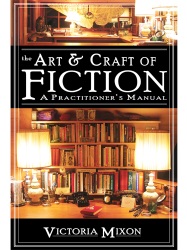Fanfiction. Yes, I write it. Harry Potter fanfiction, to be exact. I find it a great way to practice. I’ve heard so many arguments about copyright infringement, but honestly, I myself would be flattered. As long as others don’t sell my characters off as their own, I can see nothing wrong with it. It’s free publicity and probably brings in money for the writer. Even more than that, I love the idea that my work would be the inspiration that starts a whole new group on the path to become writers, that it could change them, that it could make them think so much and see so much in it. Isn’t that what we look for, after all?
So, my question to you is: what do you think about the controversy? I’m simply a eighteen-year-old girl about to graduate high school, yet you’re a published author with a successful writing blog. What are your thoughts, being on the other end?—Isabella
Congratulations, Isabella, on beginning your writing career young! It sounds as though you’re committed to your craft and very thoughtful about the current writing industry.
Copyright infringement is an entirely legal issue. Some things an author can legally copyright, and if they choose to do so then other writers break the law when they violate that copyright. This can lead to lawsuits, which the author holding the copyright will win.
Other things an author cannot legally copyright. These things must be trademarked if the author does not want to share them.
Copyright is designed to protect an author’s intellectual property: the effort they put into inventing characters, settings, fictional worlds. This effort is very hard work, and writing fiction traditionally pays so little that when an author has worked that hard on their material they often feel quite proprietary about their creative results.
I can sympathize. My colleague, Roz Morris, has compared copyright infringement to being tied up while your house is burgled.
However, is the publicity of fanfiction good for the original author? Does it promote that author’s income? Should authors take fanfiction as a compliment rather than a violation?
This is an individual decision for each author. None of us can make that decision for another.
Since the rise of the blogosphere and self-publishing, many professional writers have tackled the question of whether copyright contributes to or detracts from an author’s career. These people have created something called Creative Commons, which is a form of copyright that allows re-use of an author’s material so long as the author is credited as the creator.
So, for instance, if JK Rowling uses Creative Commons as her copyright, you could publish your Harry Potter fanfiction with the written caveat that it is based upon characters and situations created by JK Rowling. Unfortunately, I suspect that Rowling and her publisher do not use Creative Commons, which would preclude you from publishing fanfiction based upon her creations. (I’m afraid Rowling really doesn’t need any of us helping her publicize her work.)
Many other less-famous authors, though, do use Creative Commons. These are the authors you’ll want to seek out. The self-publishing industry is absolutely chock full of unknown authors who might very well be glad of any publicity they could get.
The key is respect for the author’s legal right to their own material.
If I were you, I’d search for self-published fiction copyrighted under Creative Commons and then contact the authors directly. Make friends with them. Compliment them on their terrific material. Show them that you understand the hard work they’ve put into creating their characters and fictional worlds and that you respect their right to own them. Chances are that you’ll very quickly acquire not only fresh material for your fanfiction but—more importantly—a network of writing friends interested in the same genres as you.
Then you can all move forward in promoting and publicizing each other’s work through your collective creativity. . .which is the ideal solution for everyone.
“The freshest and
most relevant advice
you’ll find.”
—Helen Gallagher,
Seattle Post-Intelligencer
The Art & Craft of Story


